Events
The wide array of activities at MDSC includes classes for children, youth, and adults;, guest speaker forums; Sisterhood and Men's Club programs; community service; musical performances; and travel to off-campus venues.
MDSC has programs to suit everyone’s age and interest. Check out our calendar for the latest updates on events and programs taking place.
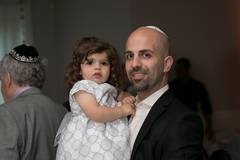
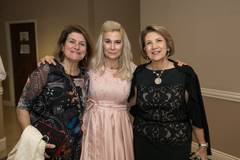
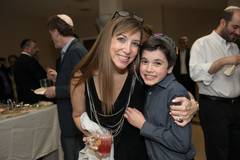
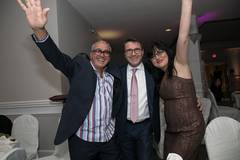

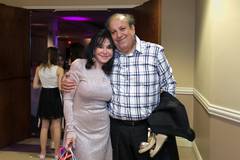
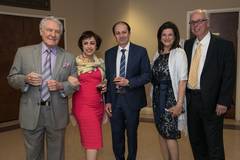
If you are not yet on the distribution list for MDSC announcements, just send an email with your name and email address to office@magendavidsephardic.org. Email addresses will be used for sending MDSC announcements only, and will not be disclosed to anyone outside the office.
Sisterhood

MDSC's Sisterhood offers members the joyful companionship of a vibrant, multigenerational group of women. Members enjoy a variety of activities andlearning experiences. They prepare and underwrite the Shabbat Kiddush, organize Jewish learning programs, develop and support social events and study programs in the synagogue and in the wider Jewish community, and coordinate tzedakah, charitable outreach to those in need.
If you're not already a member of the Sisterhood, we'll be delighted if you'll join us! Please contact Naomi, our Sisterhood President (naomieli72@gmail.com), or Andrea, our Executive Director (andrea@magendavidsephardic.org). Dues are only $18 per year.
Shabbat Kiddushim
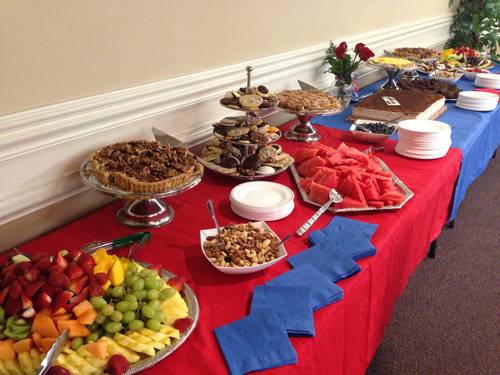
Extraordinary fare awaits congregants in the Sriqui Social Hall immediately following Shabbat morning services. On weekends, when there aren’t special events taking place in the synagogue, a basic luncheon follows the Kiddush.
Members often sponsor an upgraded or premium luncheon in celebration of a simcha or in memory of a loved one. For details on how to arrange such a luncheon, please contact our Events Manager and Sisterhood President, Naomi Elimelech (naomieli72@gmail.com).
Book Club
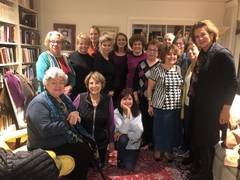
The Sisterhood Book Club is an especially enthusiastic group. Members gather monthly to discuss their love of fiction and non-fiction books with Jewish themes, and discussions are quite spirited!
Read a good book by a Jewish author lately? Looking for a fun group of women to bond with? Consider joining our next meeting and bringing along your book recommendations. For more information, please contact Jan Sedaka (jan.sedaka@verizon.net).
Sisterhood Luncheon
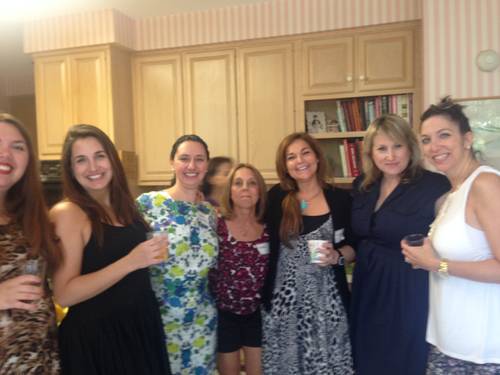
Our annual luncheon is a grand occasion for members of this close-knit, multi-generational group. Delicious Middle Eastern food and an exciting program, reinforced by a sales bazaar, cooking demonstration, or fashion show, make for a rewarding and memorable afternoon. Throughout the year, the women of MDSC participate in myriad dynamic and interesting events. The annual Sisterhood Luncheon is one of the most popular.
Community Service
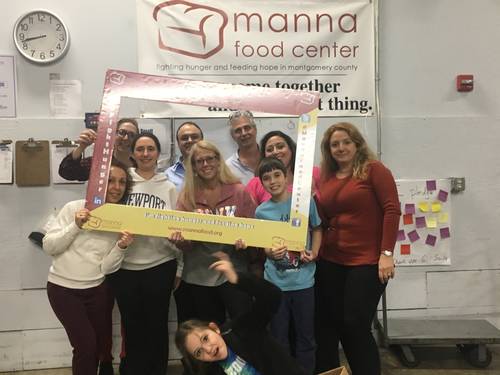
The Sisterhood is active in community clothing and food drives, aid to the elderly, and preparation of gift baskets in conjunction with Jewish holidays. A hallmark of our community outreach is our volunteer service at Manna Food Center, where members -- often joined by family members -- sort and package food for those experiencing hunger and food insecurity in Montgomery County.
Men's Club

Members of the Men's Club enjoy a variety of social events, and they also engage in service to the congregation and the community at large. Popular social events include the annual Family Fishing Expedition to the Chesapeake Bay, and the lively Scotch and Steaks night.
The Men’s Club is ever expanding its activities to include educational lectures, events in support of local Washington sports teams (Capitals and Wizards), and a "guys together" happy hour and dinner.
The Men’s Club performs outreach into the wider community, and partners with the Sisterhood to aid the needy in Montgomery County, Maryland, through the Manna food distribution program. More joint programs with the Sisterhood are in the planning.
Club members coordinate and participate in activities with MDSC’s Bikur Cholim committee.
Bikur Cholim
MDSC takes pride in the closeness of our community. We strive to be responsive and helpful when our members experience difficult times. Chesed (loving-kindness) is a value we work hard to create and sustain. Bikur Cholim (visiting the sick) is at the core of this effort.
Bikur Cholim provides comfort and companionship to members who are ill, and to elderly or physically impaired persons in need to help with day-to-day tasks. There are few mitzvot that can bring greater joy to the giver, as well as to those who receive this sincere and loving attention. For some individuals, members of the MDSC group can be their only connection to the outside world.
Volunteer members perform activities such as:
- Visits to patients in hospitals, rehabilitation facilities or nursing homes
- Preparing fruit and gift baskets
- Visits to homebound elderly or chronically ill
- Driving patients to and from doctor appointments
- Grocery shopping and other errands
- Helping with children when a parent is temporarily hospitalized
- Maintaining regular phone contact with ailing or isolated persons
- Helping elderly patients communicate with children, grandchildren and caregivers
If you'd like to be a part of our helper team, please contact one of our Bikur Cholim Coordinators --

Jacob Elbaz (elbazj@gmail.com)
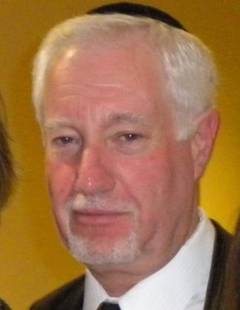
Rami Levi (ramilevi77@gmail.com)
Chevra Kadisha
“Let all who work for the community do so from a spiritual motive, for the merit of their ancestors will sustain them and their righteousness will endure.” – Rabban Gamliel, Pirkei Avot 2:2
At the end of life, Judaism guards and protests the dignity of the deceased with the prayerful ritual of taharah (preparing the body for burial). Taharah is considered the highest form of mitzvah because the beneficiary cannot express thanks or reciprocate. Those who perform this act of chesed shel emet (true loving kindness) are the Chevra Kadisha. At Magen David, members of Chevra Kadisha are observant men and women who have been carefully trained in this practice.
To receive the pre-burial ritual of taharah is the right and privilege of every Jew. Arrangements can be made through a funeral home, or you may contact the Chevra Kadisha Coordinator for MDSC, Samy Ymar, at samy@amerepro.com or 202-438-5050.
Samy is prepared to assist each member family in this time of need. If a member of the community passes away on Shabbat or a Jewish holiday, please contact Samy immediately following the conclusion of Shabbat or the holiday.
Please note, MDSC has contracted with a local funeral home for a simple, halachic Jewish funeral at a pre-determined cost. It is suggested you contact Samy before contacting a funeral home to make arrangements.
Lifecycle Events
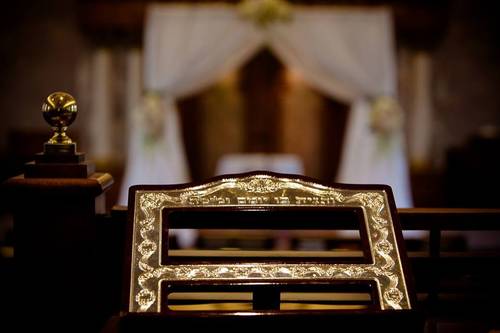
In times of joy and in times of sadness, the synagogue is a place of warmth, support, and understanding. We are a resource for all you wish to accomplish, and an aide in times of difficulties or stress.
To learn how to arrange an event or cope with a sorrow, please contact our executive director, Andrea Choobineh at andrea@magendavidsepharic.org.
Brit Milah
Circumcision (brit milah) is an outward physical sign of the covenant between G-d and the Jewish people. The ritual is performed by a mohel on the eighth day of a baby boy’s life. The baby is held by the sandak, usually a grandfather or great uncle who may be seated in the ornate and traditional “Elijah’s chair”. Although a brit may be held at home, MDSC members nearly always choose our beautiful sanctuary as the venue.
Baby Naming
In Sephardic custom, naming children after living relatives (as well as deceased ones) is encouraged. Traditionally, the first child is named after the father’s parent, and the second after the mother’s parent. This tradition has its roots in the Torah. Among Sephardim, the ceremony of naming a daughter is called zeved habat, or “presentation of the daughter”. A special mi sheberach prayer is recited.
Bar Mitzvah
A bar mitzvah is a boy’s first Aliyah. Shortly after his thirteenth birthday, he is called to the Torah for his first time on Shabbat, or at a Monday or Thursday morning service. The bar mitzvah reads the week’s first haftarah, and we are proud to say that some of our MDSC young men have read the entire Torah portion as well. Friends and family members are honored with aliyot during the Torah reading. At the end of the service the celebrant presents his d’rash to the congregation. The family usually hosts a festive meal in the synagogue’s Sriqui Social Hall.
Bat Mitzvah
The formal Bat Mitzvah has only in the past few decades been revived in American Orthodox synagogues, but Sephardic sages have long embraced the idea that a girl, like her male counterpart, is responsible for performing mitzvot, and should therefore be encouraged to become a bat mitzvah (“daughter of the commandment”). Shortly after her twelfth birthday, MDSC invites a young girl to formally recite blessings and a haftarah - or portions thereof - during a Shabbat service. At the end of the Musaf service she may present a d’rash. As in the case of a bar mitzvah, a bat mitzvah’s family honors relatives and friends with aliyot.
Marriage
An MDSC wedding is followed by a joyous reception that often recalls the customs of our Moroccan founding members. The bride and groom may change into traditional Moroccan dress and be borne aloft in chairs by the families’ strongest and hardiest. True to our Modern Orthodox orientation, men and women need not be separated at the ceremony or the reception.
Sephardim observe an additional custom, a weeklong celebratory Shevah Berachot feast-time. Friends and family arrive at the couple’s new home to wish them well; the seven wedding blessings are recited.
Death and Mourning
At no time is the warmth and chesed of the community more apparent than when an MDSC member loses a loved one. Whether the shiva is observed at home or at the synagogue, men and women, friends and acquaintances, come together for evening prayers.
The traditions of the various communities (e.g., Moroccan, Syrian, Iranian, European) influence the way a family passes through the shiva period. Some offer Turkish coffee to visitors. Some study Torah, Talmud, or Zohar throughout the week. It is not customary among Sephardim for visitors to bring food to a house of mourning, but those who wish to make the gesture (kosher certified foods only) are not discouraged.
Mourners observe the sheloshim (ending of the first 30 days) at a regularly scheduled evening service. MDSC members invariably come together on these occasions to support the mourners.
Kiddushim
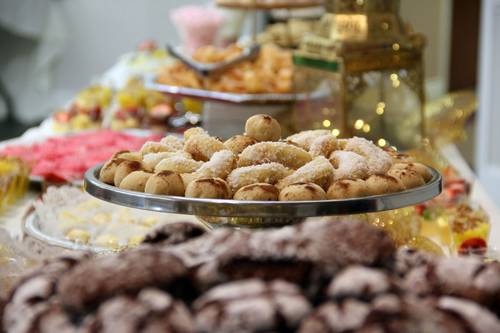
If you're celebrating a simcha, honoring a friend or family member, or planning a memorial repast, you'll want to consult MDSC's kiddush planners. They will expertly arrange for your Kiddush and Seudah needs, and will help you choose an appropriate menu.
Each week, members and friends take part in the kiddush that follows the Shabbat morning service. Average attendance is 120 people. If you are planning to invite a significant number of guests, let us know; adjustments can be made.
We are proud of our reputation for extraordinary Middle Eastern buffets, and especially for home-made hallowiyaat (sweet deserts) in their many and varied forms. We take pride also in the lively conversations that members enjoy along with their meal.
Our Sephardic presentations are not merely savory -- they are legendary (ask about our unparalleled dafina!). See below for our Kiddush and Seudah menus and our price list. If you’d like to sponsor a meal, our Sisterhood President, Naomi Elimelech naomieli72@gmail.com will be delighted to answer your questions and provide menu and presentation ideas.
To download a PDF version of our menu click here. For non-member pricing please contact Andrea at the office 301-770-6818 or at office@magendavidsephardic.org.
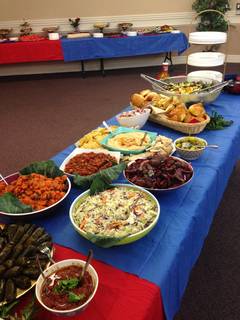
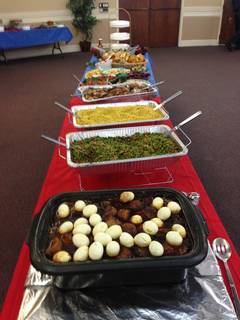
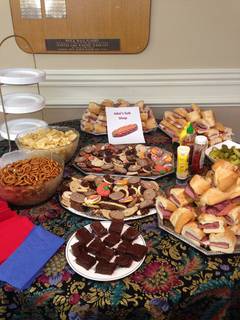
Kiddush Opportunities
YOUR KIDDUSH MENU AND MEMBER PRICE LIST
TAMAR - Basic Sponsored Kiddush: Includes eight basic items (example: tuna, egg salad, green salad, potato chips, tortilla chips, salsa, pickles, cole slaw, olives, hummus, grapes, sliced cake, cookies) bread, coffee, tea, soda, paper goods, staff and tips. Serves 100 people. Price: $485.
GEFEN - Upgraded Basic Sponsored Kiddush: Includes four basic items (example; tuna, egg salad, green salad, potato chips, tortilla chips, salsa, pickles, cole slaw, olives, hummus) one protein, 1 special salad, two kinds of fruit, two small dessert platters with at least two kinds of desserts, bread, coffee, tea, soda, paper goods, staff and tips. Serves 125 people. Price: $885.
RIMON - Premium A la Carte Kiddush: Includes two pots of dafina (a specialty of MDSC cooks), one protein, two special salads, one green salad, tuna salad, one side, bread, hummus, chips, two fruit platters, three dessert trays/platters with at least four kinds of desserts, coffee, tea, soda, paper goods, tips and staff. Serves 125 people. Price: $1,570.
EXAMPLES:
Proteins: Chicken with olives, chicken with prunes, roasted chicken with herbs, ground turkey meatballs, ground tilipia patties in Moroccan sauce.
Sides: Vegetables- peas and mushrooms, roasted root vegetables, Asian brussels sprouts, roasted baby potatoes with herbs, Moroccan chickpeas split pea soup, lentil soup, butternut squash soup, corn soup, Moroccan soup- lentil, chickpea and noodle soup, orzo pasta, rice, couscous with dried fruits, Moroccan noodles, Asian soba noodles.
Salads: Beet salad, carrot salad, babaganoush (eggplant and tahini salad), celery and cranberry salad, Asian coleslaw, broccoli and cabbage slaw, zucchini and tahini salad -- and many more to choose from.
Looking for a unique way to observe a simcha?
We can supply an Israeli style brunch. Or how about a Middle Eastern sit-down? Or Asian-inspired buffet? For more ideas and prices, contact Naomi Elimelech at naomieli72@gmail.com.
SEUDAH SHLISHEET WITH PRICING
Seudah Shlisheet is the third meal, customarily eaten on the evening of Shabbat. Frequently, members will sponsor a Seudah to honor someone they admire, or in memory of a loved one. The menu may include meat or fish. A detailed menu is available upon request. Seudah Shelisheet is a flat fee of $175 per sponsor.
NOTE: Events use of the synagogue kitchen may be made only when a mashgiach is present. The mashgiach must be approved by the Rabbi/Vaad. There are no exceptions to this rule. If the kitchen is rented for a private event, the synagogue will aid with engaging the proper authority, but the fee for this supervision is paid directly to the mashgiach by the event host.
